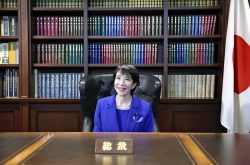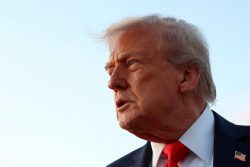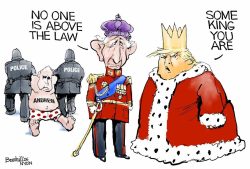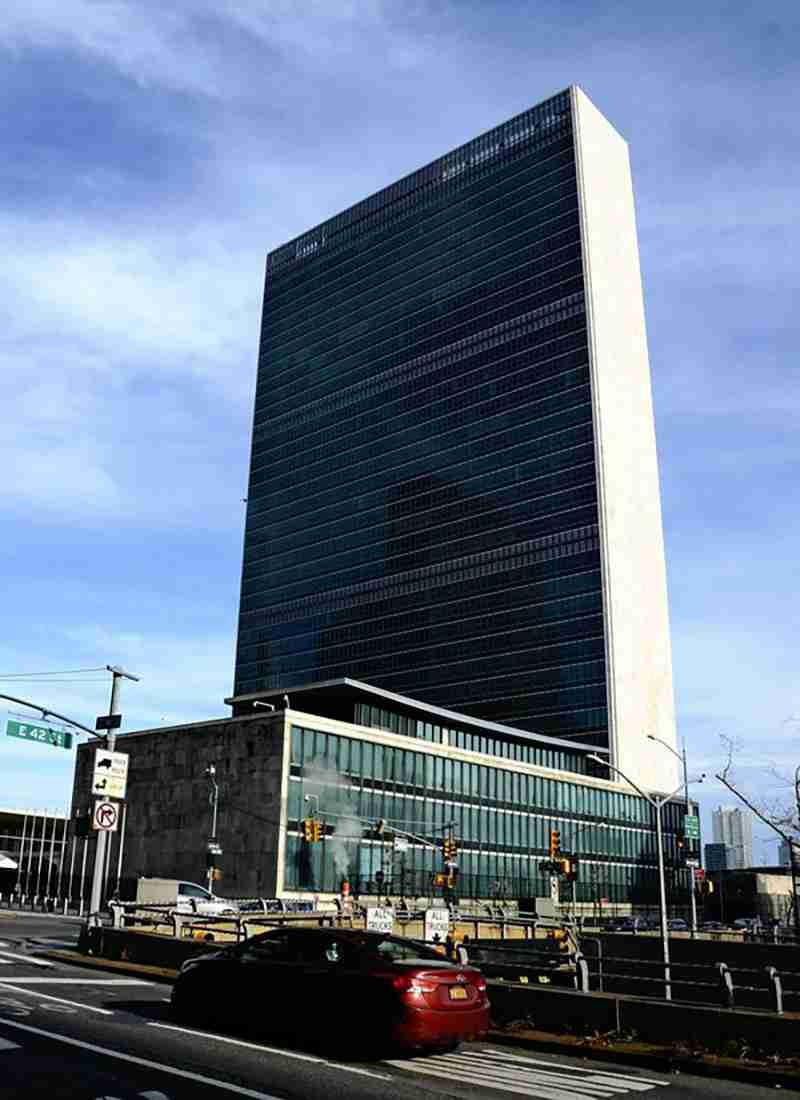
The U.N. Headquarters building in New York where the NPT conference is scheduled to be held in January
12:13 JST, December 25, 2021
NEW YORK — The Nuclear Non-Proliferation Treaty (NPT) Review Conference is scheduled to start Jan. 4 at the United Nations Headquarters in New York.
While the momentum for nuclear disarmament by the United States and Russia has stalled, China has been increasing its nuclear weapons and the non-proliferation movement has been shaken by North Korea’s nuclear development and other factors.
Given the deep-rooted confrontation between nuclear and non-nuclear weapon states, it is unclear whether the parties will be able to unite to achieve nuclear disarmament.
Tough negotiations lie ahead.
The upcoming review conference was supposed to take place in April last year but it was postponed due to the coronavirus pandemic.
The conference is scheduled to end on Jan. 28.
The parties failed to reach a final agreement at the previous conference in 2015. Whether they will be able to pave a way toward disarmament will be the focal point of the upcoming meeting.
Representatives from five NPT nuclear-weapon states including the United States and Russia met on Dec. 2 and 3 in Paris to discuss the preparations for the review conference and related matters, and adopted a joint communique expressing their “active determination to approach this milestone event in the most positive and constructive manner.”
However, the momentum for nuclear disarmament has stalled amid continued confrontations between the United States and China, and between the United States and Russia.
It is estimated that there are about 13,000 nuclear warheads around the world, and 90% of them are in the hands of the United States and Russia.
In February, the two countries announced a five-year extension of the New Strategic Arms Reduction Treaty (New START), the only agreement for nuclear arms reduction that currently exists between the United States and Russia. The two countries are currently engaged in a bilateral “strategic stability dialogue” to create a successor framework.
Meanwhile, the United States, China, Russia, and other nations are scrambling to develop hypersonic weapons that could be used as a means of delivering nuclear weapons.
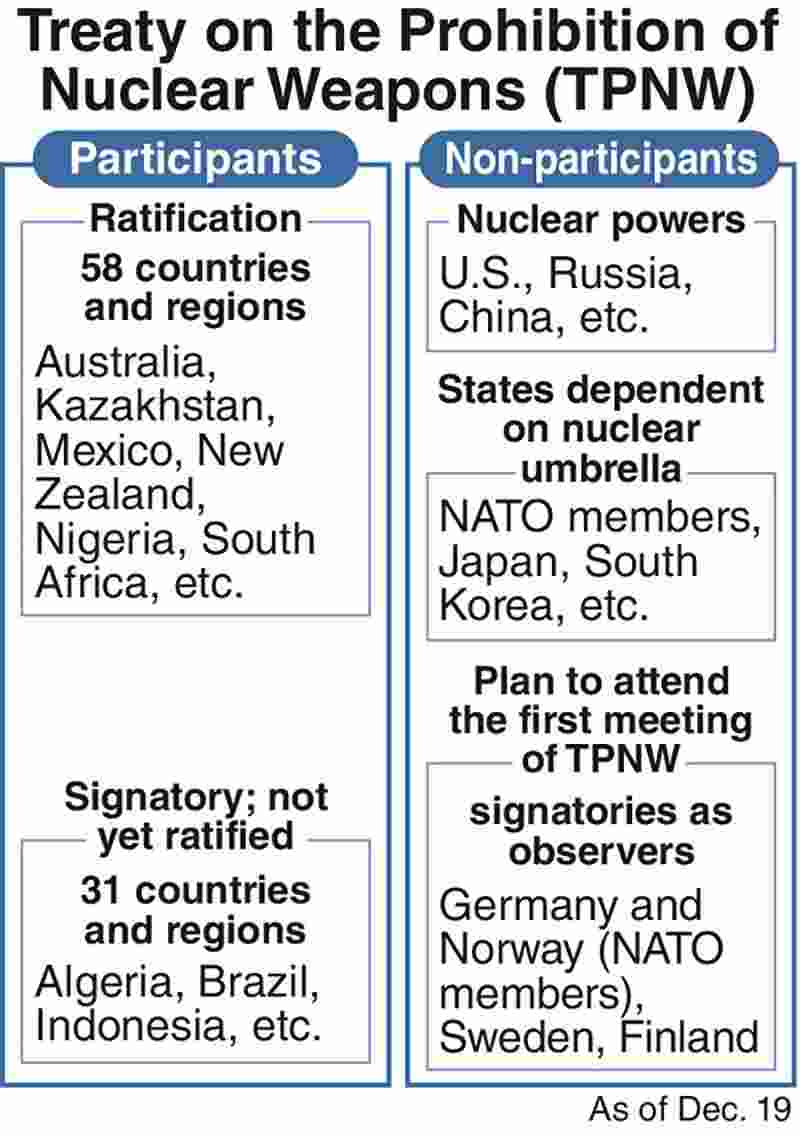
In March this year, Britain announced its intention to raise the cap on the number of nuclear warheads it possesses from 180 to 260. The actual size of China’s nuclear arsenal is unknown but Washington has said that Beijing could have as many as 1,000 nuclear warheads by 2030.
In October, at the U.N. General Assembly’s First Committee dealing with disarmament and international security issues, Izumi Nakamitsu, U.N. under-secretary-general and high representative for disarmament affairs, said that the risk of nuclear weapons being used in a confrontation between nuclear-armed nations is growing unacceptably high.
Another focus of the upcoming conference will be whether concrete measures can be established to improve the transparency of respective countries’ nuclear forces.
The previous conference failed to reach a final agreement because the United States, Britain and other countries opposed to establishing a nuclear-weapon-free zone in the Middle East, with Israel in mind. Israel is not a signatory to the NPT.
At the 2010 review conference, an agreement was reached to hold an international conference in 2012 with the participation of all Middle Eastern countries, but as of the 2015 conference, the conference had not been held and Arab countries were pressing for a deadline.
A meeting was eventually held in November 2019 and the second one was held between November and December this year, but Israel and the United States did not attend these meetings.
Israeli ambassador to the United Nations said at the U.N. General Assembly’s First Committee in October that Iran’s nuclear program was at a critical stage and emphasized that the country was not able to attend such meetings under the current circumstances.
A U.N. diplomatic source expressed concern that a confrontation regarding non-NPT member Israel may once again disrupt the conference.
Australia’s plan to introduce nuclear submarines through the AUKUS trilateral security framework with the United States and Britain is also likely to be discussed during the upcoming review.
Due to the secretive nature of submarine operations, it is difficult to confirm whether enriched uranium for fuel is being diverted for military use.
James Acton from the Carnegie Endowment for International Peace has expressed concern that it could become a loophole in inspections by the International Atomic Energy Agency (IAEA) and other security measures.
The move could also lead to criticism of nuclear-armed countries, which might result in deepening disputes.
The Preparatory Committee for the conference adjourned in May 2019 without adopting the chair’s draft recommendations, which would have served as the basis for discussions during the review.
In principle, a unanimous agreement will be required to adopt a final declaration, but some experts have expressed doubt about the possibility of achieving such an outcome.
Japan aiming to bridge the gap at NPT review conference
The upcoming Nuclear Non-Proliferation Treaty (NPT) Review Conference will be the first such gathering since the effectuation in January of the Treaty on the Prohibition of Nuclear Weapons (TPNW), nonsignatories of which are likely to face calls to join at the January conference, including Japan.
The TPNW has been ratified by 58 countries and regions.
While the NPT aims for nuclear abolition by encouraging nuclear powers to gradually reduce their nuclear arsenals, the TPNW outlaws nuclear weapons, focusing on the “inhumanity” of such arms.
Countries that rely on the U.S. nuclear umbrella — such as Japan, South Korea and North Atlantic Treaty Organization members — are not participating in the TPNW, as the treaty does not take into account the security situation and could negate nuclear deterrence.
The Japanese government hopes to build consensus by bridging the gap between the nuclear powers and non-nuclear weapon states, while cooperating with the TPNW signatories.
“We want to avoid a situation where we cannot agree on the final document [at the review conference] due to differences in approach, even though we share the goal of nuclear abolition,” a Japanese government official said.
The first meeting of the TPNW signatories will be held in March, and NATO members Germany and Norway are expected to participate as observers.
The city of Hiroshima and others are urging the central government to also attend as an observer, but officials have expressed caution.
“Japan is surrounded by China and North Korea, so the situation is different from that of Europe,” a government official said.
Top Articles in World
-

Israeli Ambassador to Japan Speaks about Japan’s Role in the Reconstruction of Gaza
-

Videos Plagiarized, Reposted with False Subtitles Claiming ‘Ryukyu Belongs to China’; Anti-China False Information Also Posted in Japan
-

North Korea Possibly Launches Ballistic Missile
-

Chinese Embassy in Japan Reiterates Call for Chinese People to Refrain from Traveling to Japan; Call Comes in Wake of ¥400 Mil. Robbery
-

Pentagon Foresees ‘More Limited’ Role in Deterring North Korea
JN ACCESS RANKING
-

Japan PM Takaichi’s Cabinet Resigns en Masse
-

Japan Institute to Use Domestic Commercial Optical Lattice Clock to Set Japan Standard Time
-

Israeli Ambassador to Japan Speaks about Japan’s Role in the Reconstruction of Gaza
-

Man Infected with Measles Reportedly Dined at Restaurant in Tokyo Station
-

Man Infected with Measles May Have Come in Contact with Many People in Tokyo, Went to Store, Restaurant Around When Symptoms Emerged



